Energy Efficiency
Curated Tips on Boosting Heat Pump Energy Efficiency

Are you fed up with paying high energy bills and dealing with inefficient heating? You’re in luck! We have put together a list of tips to assist you in improving your heat pump’s energy efficiency and cutting costs.
With regular maintenance tasks, optimal temperature settings, and proper insulation, you can improve the performance of your heat pump.
Plus, we’ll show you how to take advantage of rebates and incentives to upgrade to a high-efficiency model.
Let’s start serving you with the knowledge you need!
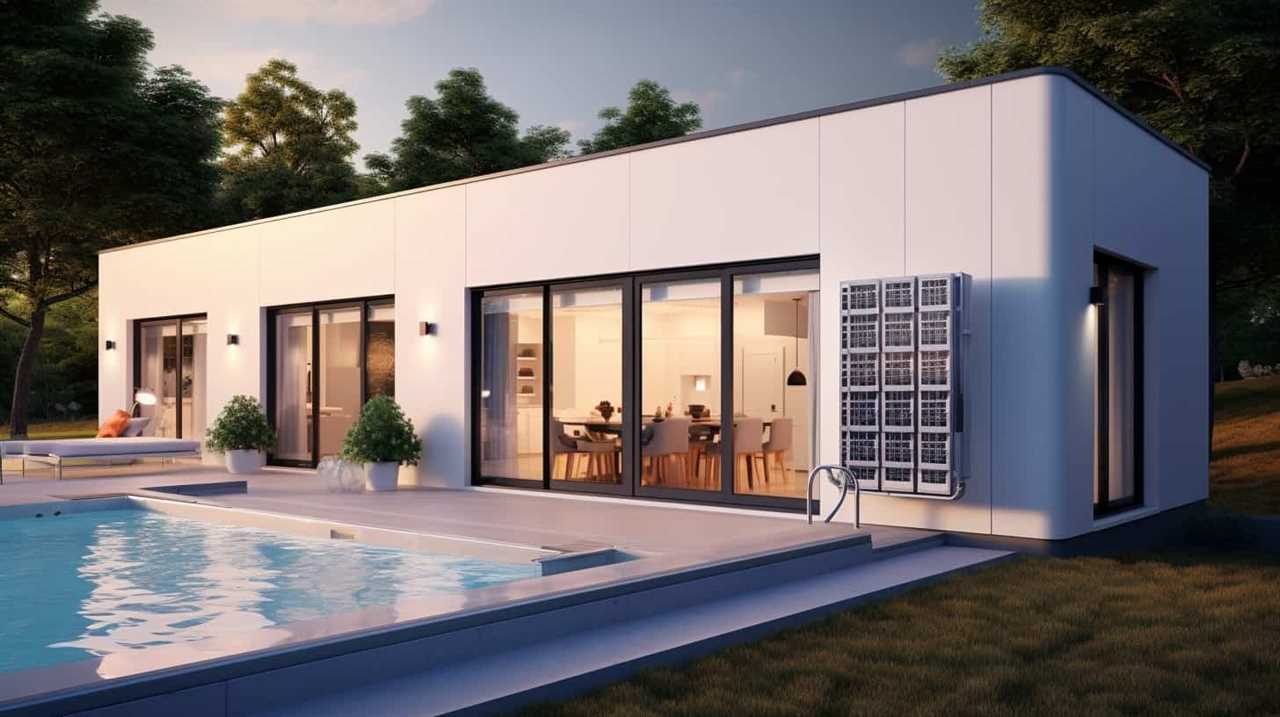
Key Takeaways
- Regular maintenance and filter replacement improve energy efficiency and indoor air quality.
- Adjusting temperature settings and utilizing programmable thermostats can reduce energy consumption.
- Inspecting and sealing ductwork prevents air leaks and improves energy efficiency.
- Proper insulation, ceiling fans, and energy-efficient window treatments contribute to enhanced energy efficiency.
Regular Maintenance Tasks
We should regularly clean the air filters of our heat pump to ensure optimal energy efficiency. Air filters play a crucial role in the functioning of a heat pump by trapping dust, dirt, and other particles that could potentially clog the system. When these filters become dirty or clogged, it restricts the airflow, forcing the heat pump to work harder and consume more energy.
Regularly cleaning or replacing the air filters can significantly improve the heat pump’s performance and energy efficiency. It’s recommended to clean the filters at least once every three months, or more frequently in high-dust environments. This simple maintenance task not only saves energy but also helps to maintain good indoor air quality.
Optimal Temperature Settings
To maximize energy efficiency, it’s important to set the temperature on our heat pump to a specific range and avoid extreme settings. Here are four optimal temperature control techniques that can help save energy:
-
Set the thermostat to a comfortable temperature during occupied hours and lower it by a few degrees during unoccupied periods to reduce energy consumption.

-
Utilize programmable thermostats to automatically adjust the temperature based on your daily schedule and preferences.
-
Maintain a consistent temperature rather than frequently adjusting it, as this can lead to unnecessary energy usage.
-
Take advantage of the heat pump’s ability to both heat and cool your home, allowing you to set a moderate temperature range that suits both seasons.
By implementing these energy-saving techniques, you can optimize your heat pump’s temperature settings and reduce energy consumption.
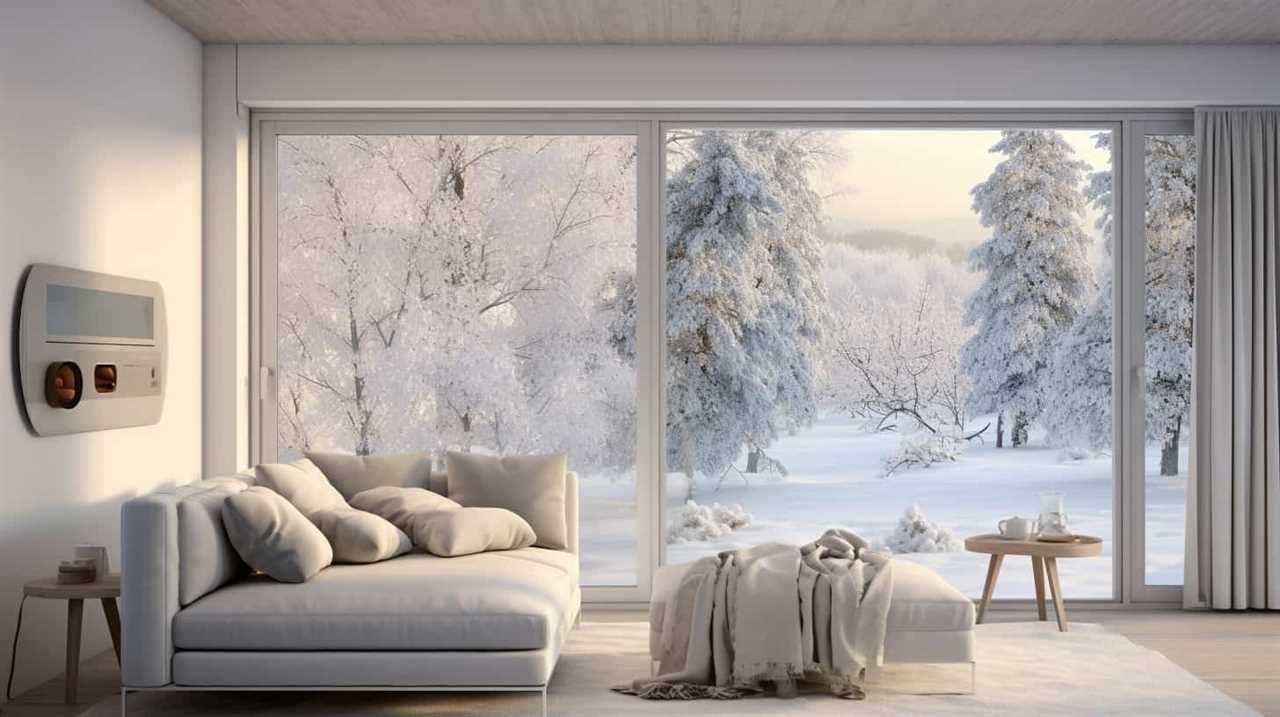
Now, let’s move on to the next topic of air filter replacement, which is crucial for maintaining the efficiency of your heat pump system.
Air Filter Replacement
Regular air filter replacement is a crucial aspect of maintaining heat pump energy efficiency. By ensuring that filters are replaced according to manufacturer guidelines, homeowners can optimize the performance of their heat pumps and reduce energy consumption.
Proper filter maintenance, such as cleaning or replacing filters as needed, can lead to significant energy savings over time.
Importance of Regular Replacement
When it comes to boosting heat pump energy efficiency, one important factor to consider is regularly replacing the air filter. A clean and properly functioning air filter is crucial for ensuring optimal performance and energy efficiency of your heat pump system.
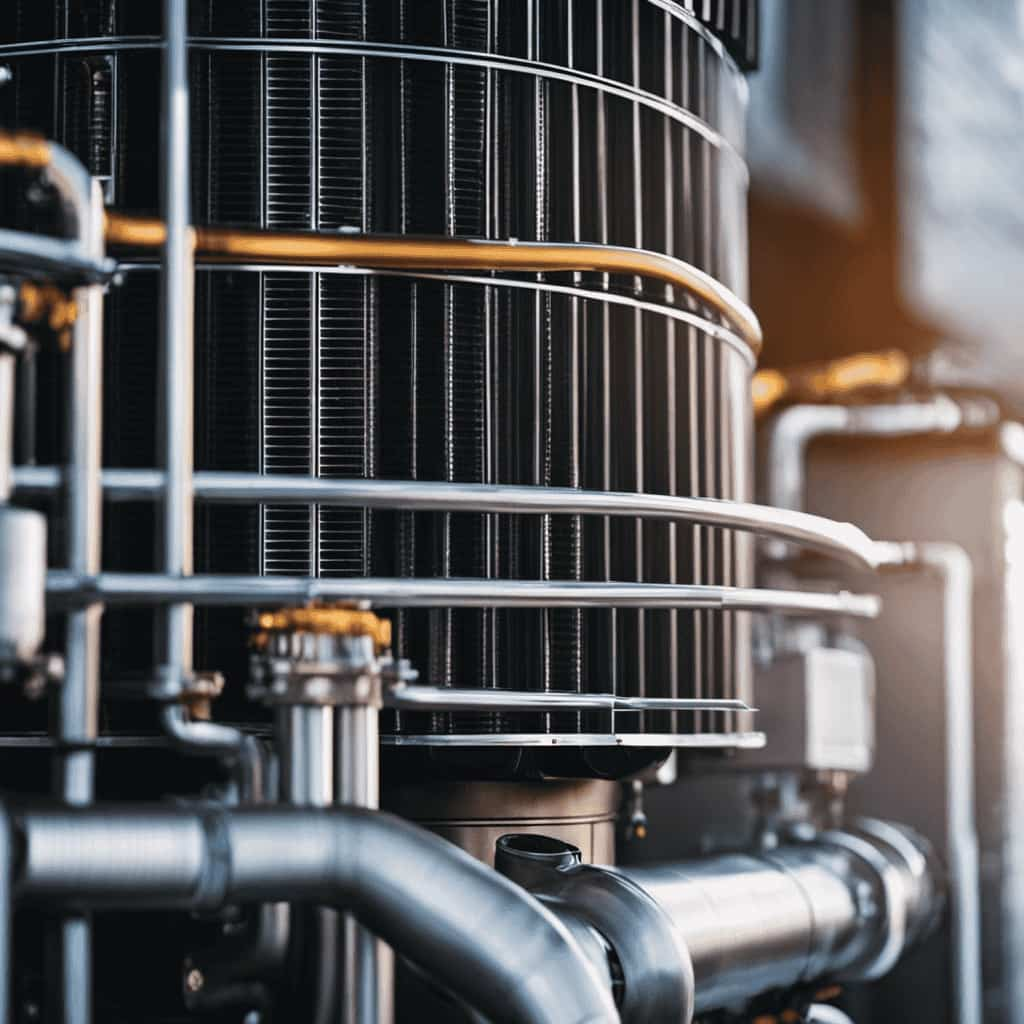
Here are four key reasons why regular air filter replacement is essential:
-
Improved Air Quality: A dirty air filter can accumulate dust, allergens, and other particles, compromising the air quality in your home. Regular replacement ensures cleaner air and a healthier environment for you and your family.
-
Enhanced Energy Efficiency: A clean air filter allows for better airflow, reducing strain on the heat pump’s motor. This improved airflow leads to increased energy efficiency, reducing your energy consumption and lowering utility bills.
-
Extended Lifespan: Regularly replacing the air filter prevents the build-up of dirt and debris on vital components of the heat pump. This helps to extend the lifespan of the unit and avoid costly repairs or premature replacements.
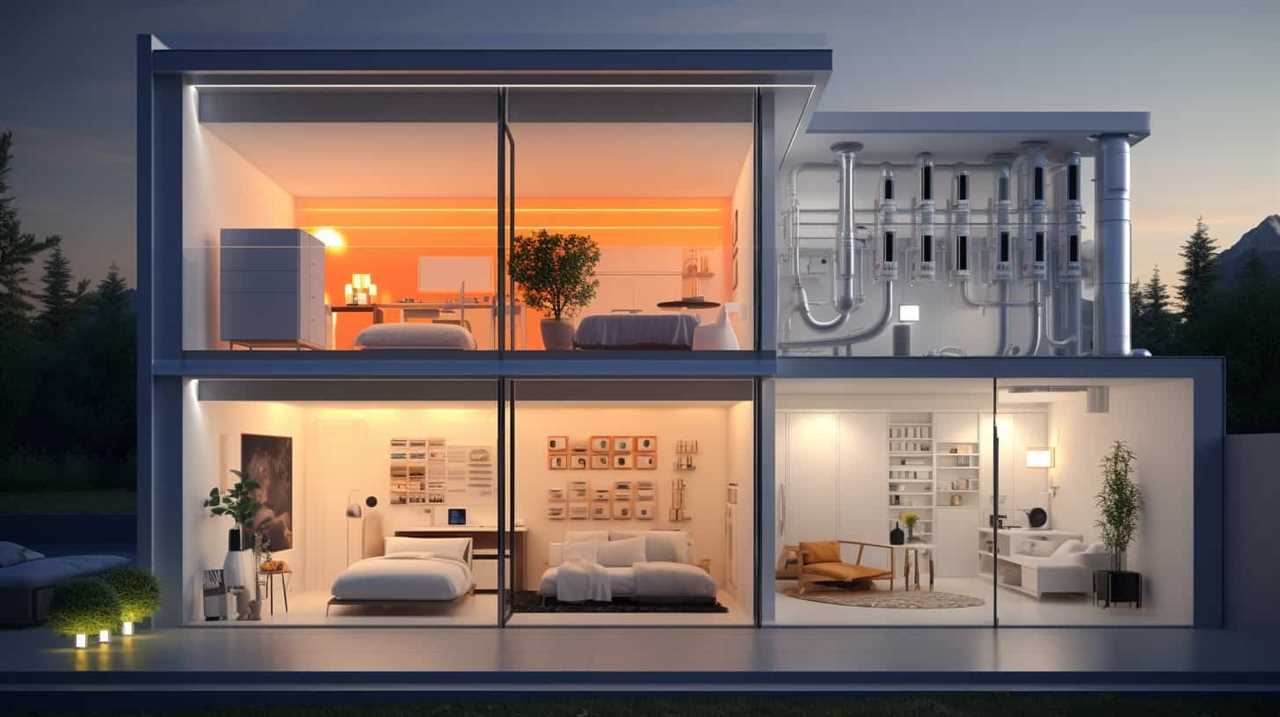
-
Cost Savings: By maintaining a clean air filter, you can maximize the energy efficiency of your heat pump, resulting in significant cost savings over time.
Energy Savings Potential
We should consistently replace the air filter in order to maximize energy savings potential. Regular air filter replacement is an essential part of maintaining the efficiency of a heat pump system.
When the air filter becomes dirty and clogged, it restricts the airflow, making the heat pump work harder to provide the desired heating or cooling. This increased workload leads to higher energy consumption and decreased efficiency. By regularly replacing the air filter, we can ensure that the heat pump operates at its optimal level, reducing energy waste and saving on utility bills.
Additionally, a clean air filter improves indoor air quality by trapping dust, pollen, and other particles. To determine the ideal replacement frequency, consider factors such as the air quality in your area, the number of occupants in your home, and the level of usage.
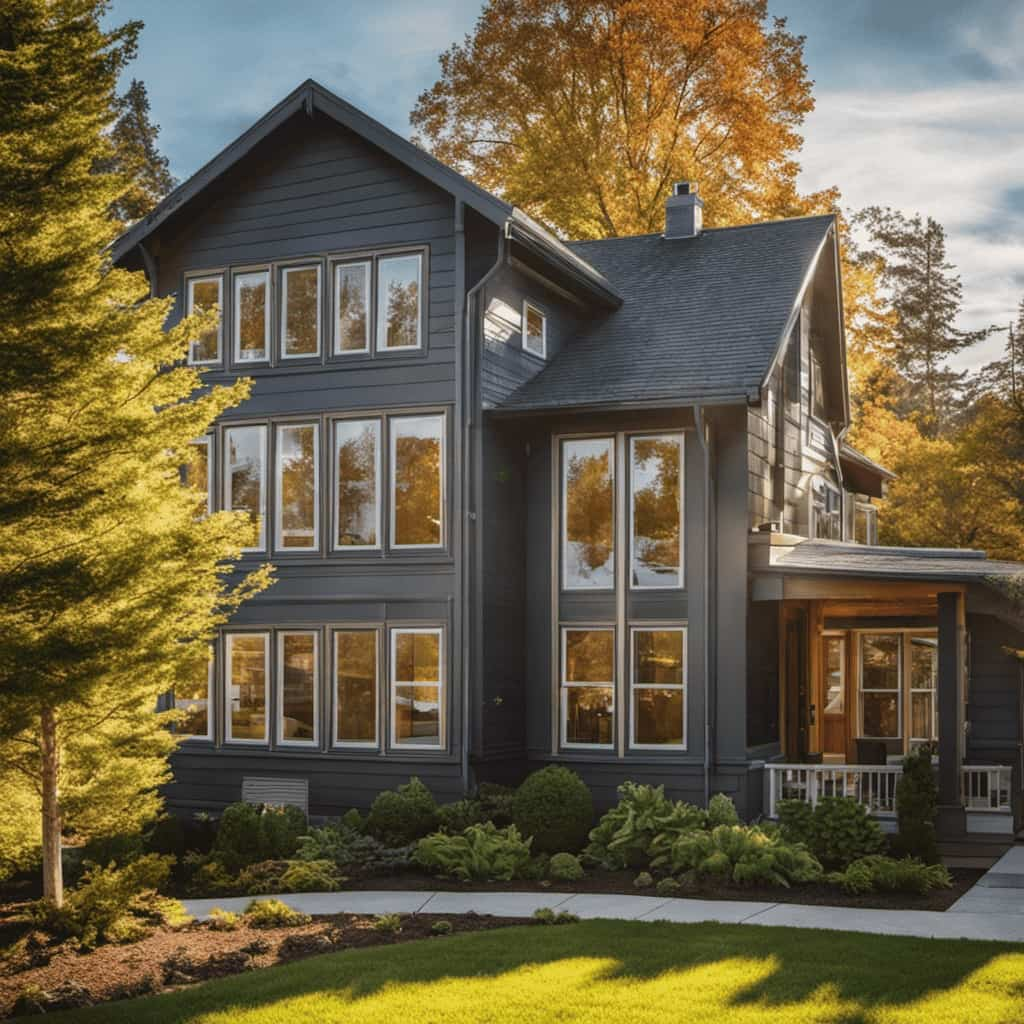
Conducting an energy audit can help identify areas for improvement, including the importance of air filter replacement and insulation benefits.
Proper Filter Maintenance
One important aspect of maintaining energy efficiency in our heat pump system is regularly replacing the air filter. Proper air filter maintenance is crucial for ensuring the energy efficient operation of our heat pump.
Here are four key reasons why regular air filter replacement is important:
-
Improved airflow: A clean air filter allows for better airflow, ensuring optimal performance and efficiency of our heat pump system.

-
Enhanced indoor air quality: A dirty air filter can accumulate dust, allergens, and pollutants, compromising the air quality in our home. Regular replacement helps keep the air clean and healthy.
-
Extended system lifespan: A clogged air filter can strain the heat pump, leading to increased wear and tear. By replacing the filter regularly, we can prolong the lifespan of our system.
-
Energy savings: A clean air filter allows the heat pump to operate more efficiently, reducing energy consumption and lowering utility bills.
By prioritizing air filter maintenance, we can maximize energy efficiency and enjoy the benefits of a properly functioning heat pump system.
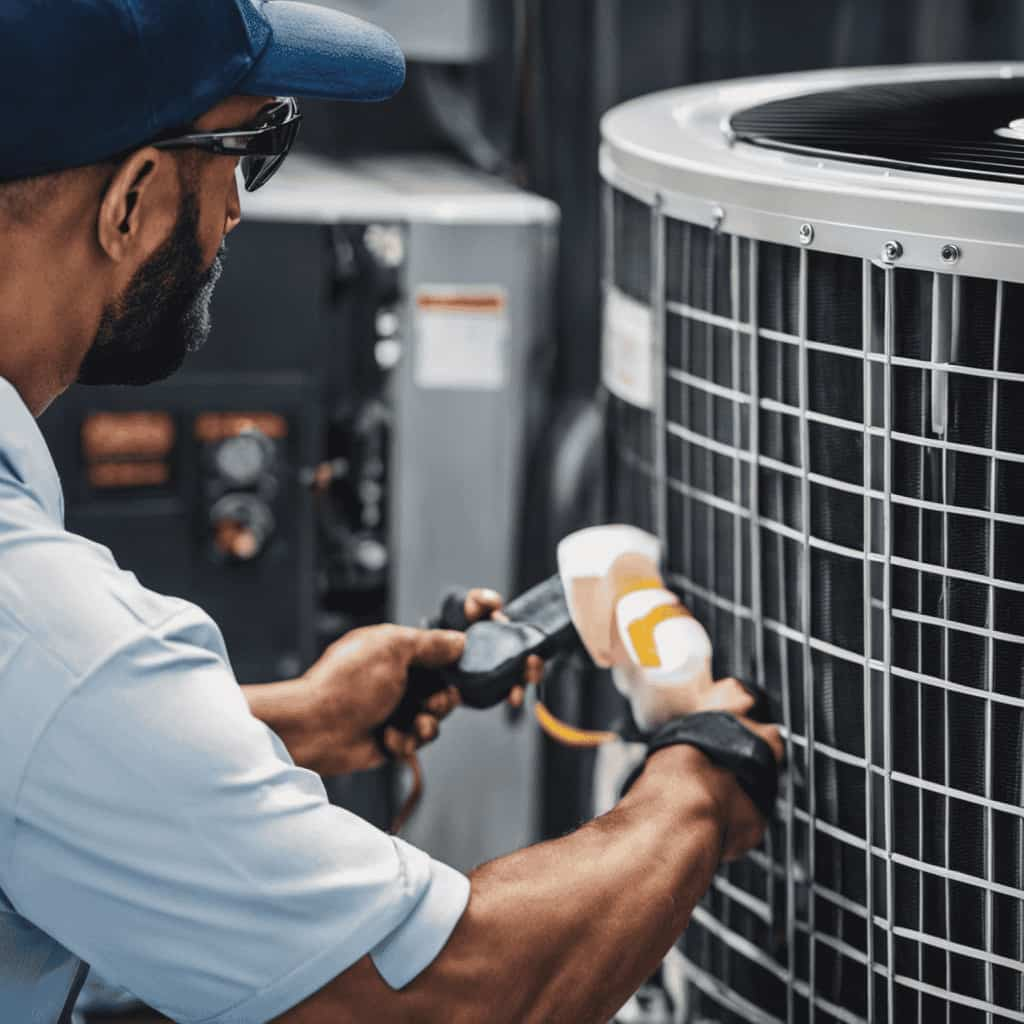
Now, let’s move on to the next topic: proper insulation.
Proper Insulation
To maximize heat pump energy efficiency, it’s essential to ensure that our home has proper insulation in all areas.
One of the main culprits of energy loss in a home is air leakage. This occurs when the conditioned air from inside the house escapes to the outside, or when unconditioned air from outside infiltrates the home. To prevent air leakage, it’s crucial to seal any gaps or cracks in the walls, windows, and doors.
Insulation materials play a vital role in reducing heat transfer between the inside and outside of the house. Common insulation materials include fiberglass, cellulose, and foam. These materials are designed to resist heat flow and maintain a comfortable temperature inside the home.

Utilizing Programmable Thermostats
The article provides curated tips on boosting heat pump energy efficiency, and a key strategy is utilizing programmable thermostats. Here are four benefits of using programmable thermostats and some energy efficient thermostat options:
-
Energy Savings: Programmable thermostats allow you to set different temperature schedules throughout the day, reducing energy consumption when you’re away or asleep.
-
Increased Comfort: With programmable thermostats, you can pre-set your desired temperature, ensuring a comfortable environment when you arrive home or wake up in the morning.
-
Remote Control Access: Many programmable thermostats offer smartphone apps or online platforms, allowing you to adjust your home’s temperature remotely, helping you save energy even when you’re not at home.

-
Energy Efficient Options: Look for thermostats that are ENERGY STAR certified, as they meet strict energy efficiency guidelines, ensuring optimal performance and savings.
Ductwork Inspection and Sealing
When it comes to heat pump energy efficiency, one important factor to consider is the condition of your ductwork. Leaky ducts can waste a significant amount of energy, resulting in higher utility bills and decreased comfort.
Leaky Ducts Waste Energy
Our team recommends inspecting and sealing ductwork to address leaky ducts, which waste energy. Here are four reasons why ductwork maintenance and sealing are important energy-saving techniques:
-
Energy Efficiency: Leaky ducts can cause cool or warm air to escape, resulting in higher energy consumption and increased utility bills. By sealing these leaks, you can ensure that the conditioned air reaches its intended destination, improving overall energy efficiency.
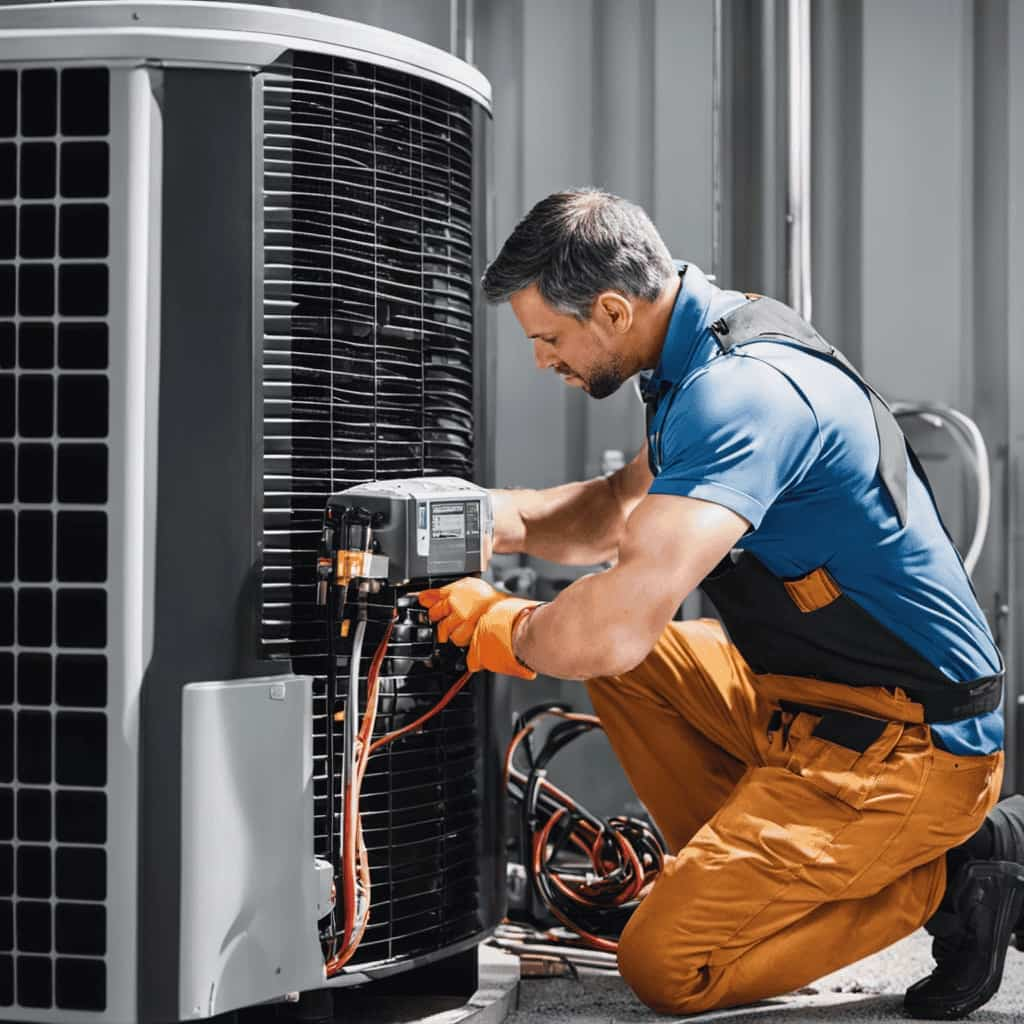
-
Comfort Optimization: Leaky ducts can lead to uneven heating or cooling throughout your home, causing discomfort in certain areas. By sealing the ductwork, you can achieve more consistent temperatures, enhancing comfort levels for everyone in your household.
-
Indoor Air Quality: Leaky ducts can allow dust, allergens, and pollutants to enter your living spaces. Properly sealed ductwork helps maintain better indoor air quality by preventing these contaminants from circulating throughout your home.
-
Extended Equipment Lifespan: Leaky ducts can strain your heating and cooling system, leading to premature wear and tear. By sealing the ductwork, you can reduce the workload on your equipment, potentially extending its lifespan and reducing the need for costly repairs or replacements.
Sealing ductwork not only improves energy efficiency but also enhances comfort, indoor air quality, and equipment longevity. In the next section, we’ll explore how proper sealing improves efficiency even further.
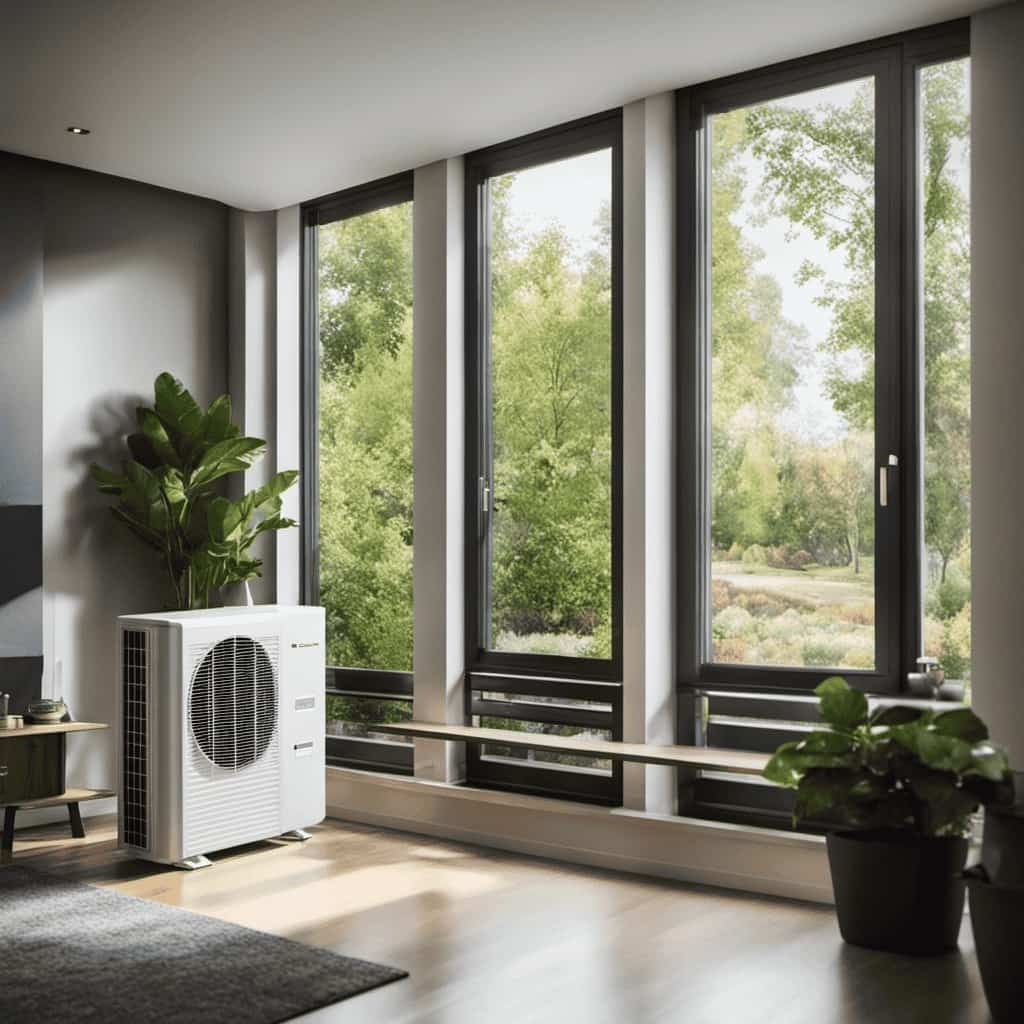
Proper Sealing Improves Efficiency
To maximize efficiency, we recommend inspecting and sealing the ductwork to prevent air leaks. Proper sealing techniques are essential for ensuring that your heat pump operates at its highest efficiency.
Over time, ductwork can develop leaks and cracks, causing air to escape and reducing the overall performance of your system. By inspecting and sealing your ductwork, you can prevent air leaks and improve energy efficiency.
Start by visually inspecting your ducts for any visible signs of damage. Next, use mastic sealant or metal tape to seal any gaps or cracks. Additionally, insulating your ductwork can further improve energy efficiency by preventing heat loss or gain.
Regular ductwork inspection and sealing should be a part of your routine heat pump maintenance to ensure optimal performance and energy efficiency.
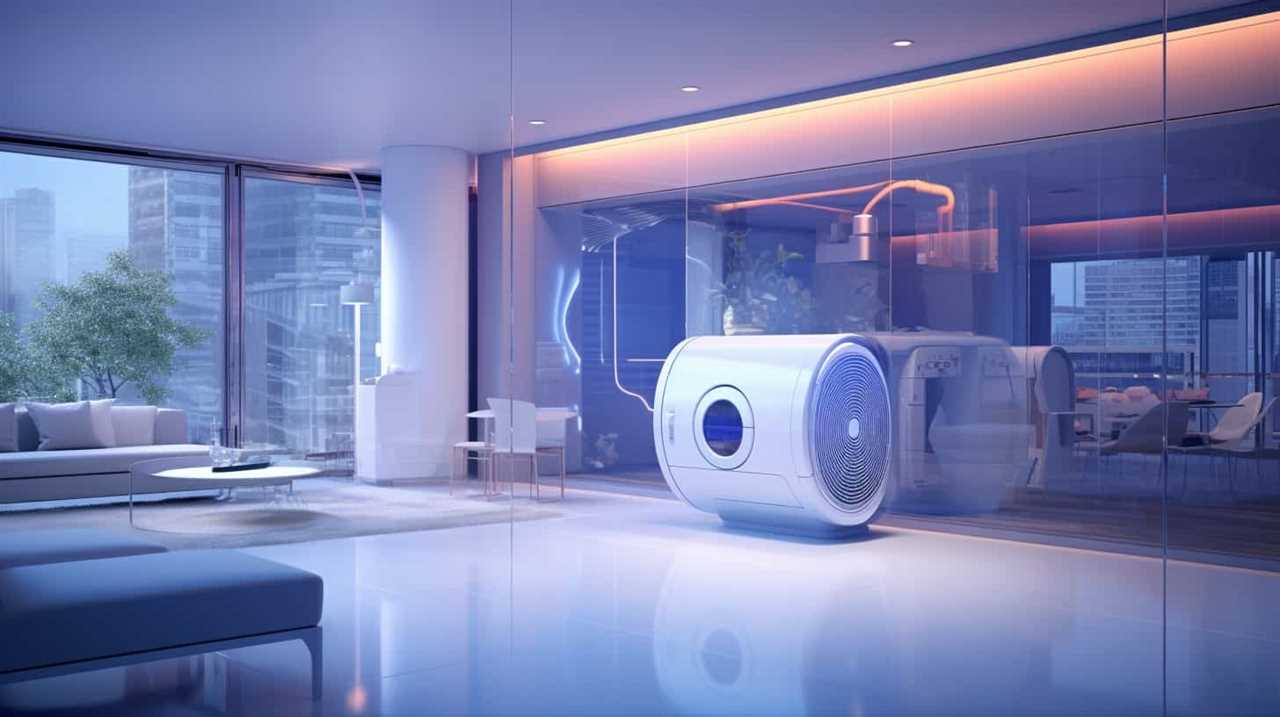
Regular Inspections Prevent Leaks
For optimal energy efficiency, we recommend regular inspections of the ductwork to detect and seal any leaks. By preventing leaks in the ductwork, you can maximize the performance of your heat pump system and reduce energy waste.
Here are four maintenance benefits of conducting regular inspections and sealing any leaks in your ductwork:
-
Improved energy efficiency: Leaks in the ductwork can result in significant energy loss, as conditioned air escapes into unconditioned spaces. By sealing these leaks, you can ensure that the heated or cooled air reaches its intended destination, reducing energy consumption and lowering your utility bills.
-
Enhanced comfort: Leaks in the ductwork can lead to uneven heating or cooling, with certain areas of your home feeling too hot or too cold. By sealing these leaks, you can achieve more balanced airflow, resulting in improved comfort throughout your living spaces.
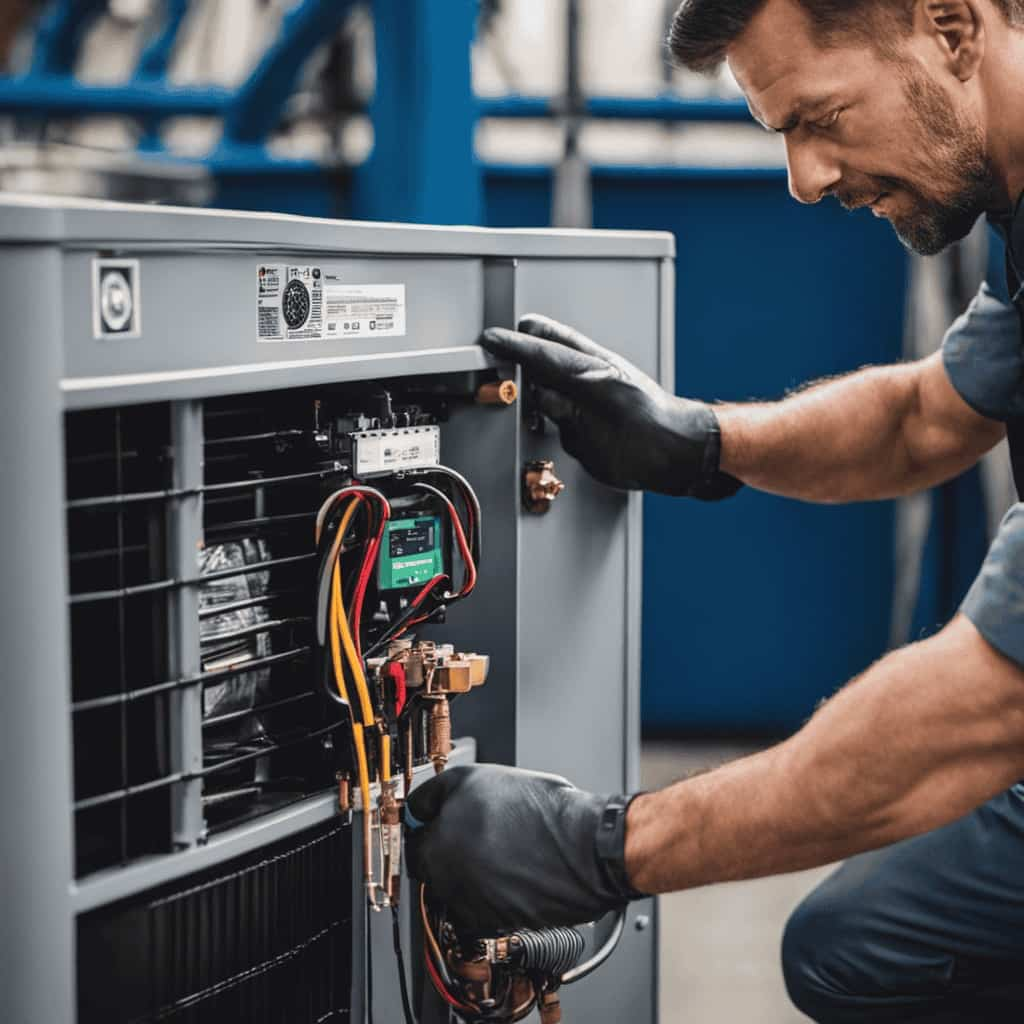
-
Extended equipment lifespan: When your ductwork is properly sealed, your heat pump doesn’t have to work as hard to deliver the desired temperature. This reduced strain on the system can prolong its lifespan and minimize the need for costly repairs or replacements.
-
Improved indoor air quality: Leaks in the ductwork can allow dust, dirt, and other contaminants to enter the system and circulate throughout your home. By sealing these leaks, you can prevent the infiltration of pollutants, improving the overall indoor air quality and creating a healthier living environment for you and your family.
Regular inspections and sealing of ductwork are essential for leak prevention and to enjoy the maintenance benefits mentioned above. Don’t overlook this crucial step in ensuring the energy efficiency and performance of your heat pump system.
Utilizing Ceiling Fans
Ceiling fans can help increase energy efficiency by circulating air and creating a cooling effect, resulting in potential energy savings of up to 10%. When used in conjunction with a heat pump, ceiling fans can enhance the overall performance of the system by improving air circulation. By distributing the conditioned air more effectively throughout the room, ceiling fans help eliminate hot and cold spots, ensuring a more comfortable environment.

Take a look at the table below to see some of the benefits of utilizing ceiling fans:
| Ceiling Fan Benefits |
|---|
| Improved air circulation |
| Energy savings |
| Enhanced comfort |
| Better distribution of conditioned air |
| Reduced strain on the heat pump |
Implementing Zoning Systems
When it comes to implementing zoning systems in our homes, there are several key points to consider.
First, zoning systems can help reduce energy waste by allowing us to heat or cool specific areas of our homes based on occupancy or usage. This targeted approach ensures that energy isn’t wasted on heating or cooling unused spaces.
Additionally, zoning systems enhance temperature control by allowing us to set different temperatures for different zones, providing personalized comfort throughout our homes.

Lastly, zoning systems optimize heat distribution by directing warm or cool air to the areas that need it most, ensuring balanced comfort and energy efficiency.
Reducing Energy Waste
Let’s explore how we can maximize heat pump energy efficiency by implementing zoning systems to reduce energy waste. Zoning systems are a smart technology solution that can help homeowners effectively control the temperature in different areas of their homes.
Here are four ways implementing zoning systems can reduce energy consumption and minimize waste:
-
Tailored comfort: Zoning systems allow you to set different temperatures in different zones, ensuring that each area is only heated or cooled when needed. This personalized approach prevents unnecessary energy usage.

-
Energy savings: By heating or cooling only the occupied areas, zoning systems help reduce energy waste, resulting in significant cost savings on your energy bills.
-
Optimal efficiency: With zoning systems, you can prioritize areas that need more heating or cooling, while reducing energy usage in less frequently used spaces. This targeted approach ensures that your heat pump operates at its highest efficiency.
-
Environmental benefits: By implementing zoning systems, you actively contribute to reducing your carbon footprint. By minimizing energy waste, you’re helping to conserve valuable resources and protect the environment.
Implementing zoning systems is a practical step towards reducing energy waste and maximizing heat pump efficiency.
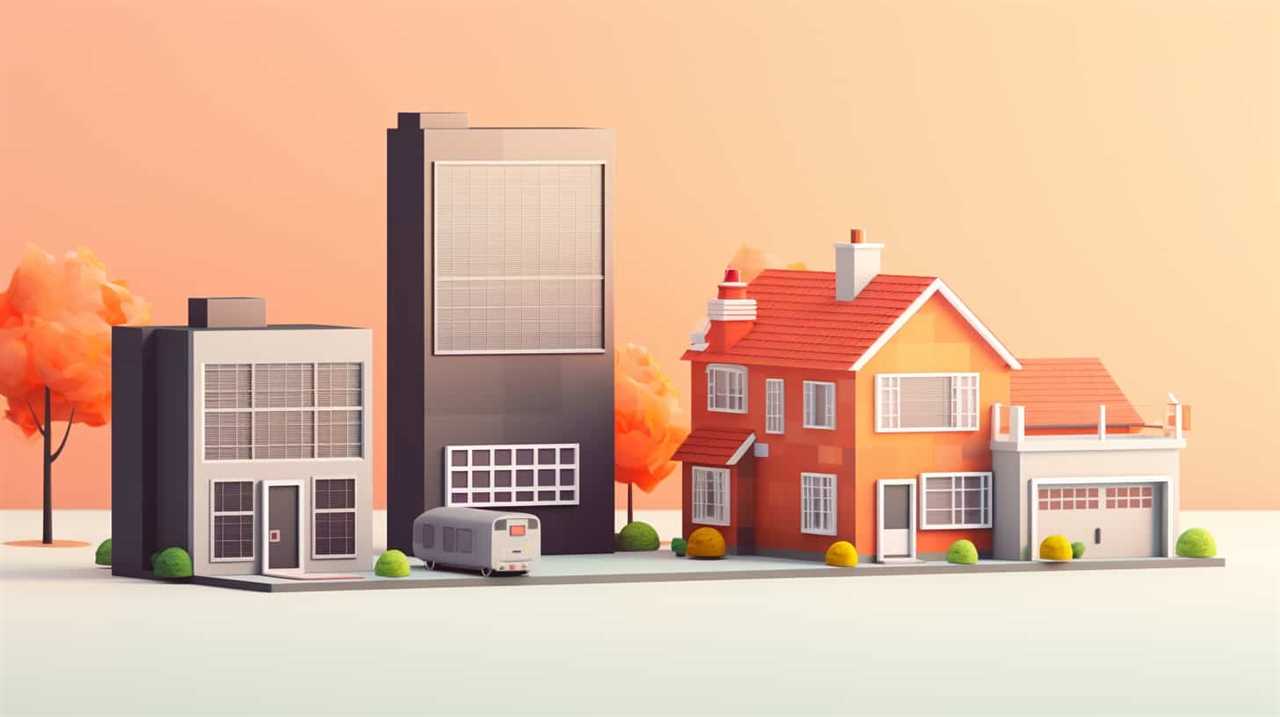
Enhancing Temperature Control
We can enhance temperature control and maximize heat pump energy efficiency by implementing zoning systems, which allow us to regulate different areas of our homes with precision and effectiveness. By dividing our homes into separate zones, we can customize the temperature settings in each area based on individual preferences and usage patterns. This not only improves comfort but also reduces energy waste by avoiding unnecessary heating or cooling in unoccupied rooms. To further optimize temperature control, it is important to improve thermostat accuracy. Regular calibration and placement of thermostats away from direct sunlight or drafts can help achieve more accurate temperature readings. Additionally, maximizing air circulation within each zone can enhance temperature distribution and improve overall comfort. By implementing zoning systems, we can achieve better temperature control, energy efficiency, and a more comfortable living environment.
| Benefits of Implementing Zoning Systems |
|---|
| 1. Customizable temperature settings based on individual preferences |
| 2. Reduced energy waste by avoiding unnecessary heating or cooling in unoccupied rooms |
| 3. Enhanced comfort and improved temperature distribution within each zone |
Optimizing Heat Distribution
To ensure efficient heat distribution throughout our homes, we can optimize the use of zoning systems and implement strategies such as adjusting damper settings and utilizing smart thermostats. Here are four ways to optimize airflow and achieve effective heat distribution:
-
Install a zoning system: This system allows you to divide your home into different zones and control the temperature in each zone individually. By doing so, you can direct heat to the areas that need it the most, avoiding unnecessary heating in unoccupied or lesser-used spaces.
-
Adjust damper settings: By adjusting the dampers in your HVAC system, you can regulate the airflow to different areas of your home. This helps in directing heat where it’s needed and prevents it from being wasted in areas that don’t require as much heating.

-
Utilize smart thermostats: Smart thermostats allow you to program and control the temperature in each zone of your home. They can automatically adjust the temperature based on occupancy or time of day, ensuring optimal comfort and energy efficiency.
-
Balance the system: Ensure that your HVAC system is properly balanced by adjusting the airflow in each zone. This helps in maintaining consistent temperatures throughout your home and prevents hot or cold spots.
Utilizing Energy-Efficient Window Treatments
Using energy-efficient window treatments can significantly improve the energy efficiency of our heat pump system. By properly choosing and utilizing energy saving curtains and window shades, we can reduce heat loss during winter and prevent unwanted heat gain during summer.
Energy saving curtains are designed with thermal properties that help insulate the windows, preventing heat transfer. These curtains are typically made of thick, tightly-woven fabrics that act as a barrier against drafts and cold air infiltration. Window shades, on the other hand, can be adjusted to control the amount of sunlight entering the room. By blocking direct sunlight, window shades reduce the need for air conditioning and help maintain a comfortable indoor temperature.

By combining energy saving curtains with window shades, we can create a more energy-efficient environment, reducing the workload on our heat pump system and ultimately saving on energy costs.
| Curtain Type | Materials | Benefits |
|---|---|---|
| Thermal curtains | Thick, tightly-woven fabrics | Insulates windows, reduces heat loss |
| Blackout curtains | Light-blocking materials | Blocks sunlight, reduces heat gain |
| Insulated shades | Cellular or roller shades with insulation | Controls light and temperature, reduces energy consumption |
Monitoring and Adjusting Refrigerant Levels
Regularly checking and appropriately adjusting refrigerant levels is essential for maximizing the energy efficiency of our heat pump system. By maintaining optimal refrigerant levels, we can ensure that our heat pump operates at peak performance, reducing energy consumption and prolonging the system’s lifespan.
Here are four key steps to effective refrigerant maintenance and monitoring:
-
Conduct regular inspections: Schedule routine checks to assess the refrigerant levels in the system. This will help identify any potential leaks or issues that may affect the system’s efficiency.
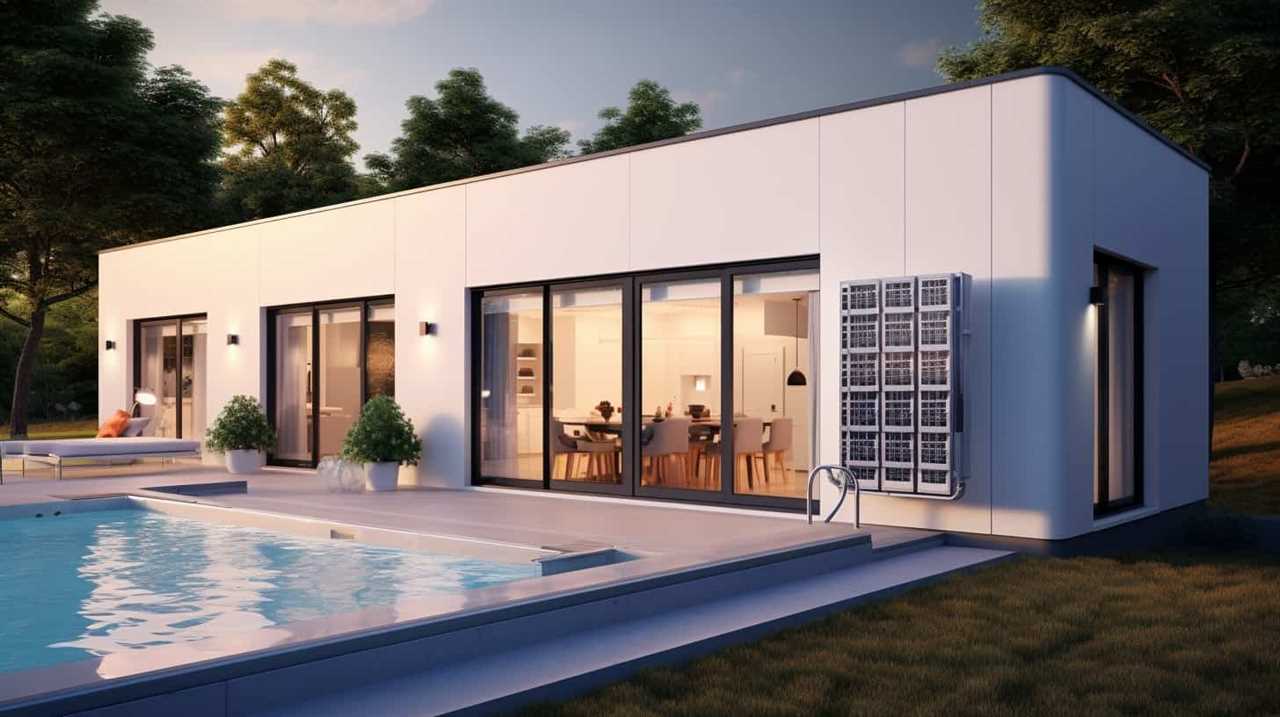
-
Monitor pressure levels: Keep an eye on the pressure readings of the refrigerant to ensure they’re within the manufacturer’s recommended range. Deviations from these levels may indicate a problem that needs attention.
-
Adjust refrigerant levels: If the pressure levels are too low or too high, it’s crucial to adjust the refrigerant accordingly. Consult the manufacturer’s guidelines or seek professional assistance to make the necessary adjustments.
-
Address leaks promptly: Leaks can lead to refrigerant loss, compromising the system’s performance and energy efficiency. If any leaks are detected, they should be identified and repaired promptly to prevent further issues.
Taking Advantage of Heat Pump Rebates and Incentives
We can maximize our heat pump energy efficiency by taking advantage of available rebates and incentives. Many utility companies, government agencies, and other organizations offer financial incentives for homeowners who invest in energy-efficient home improvements, including heat pump maintenance or upgrading to a high-efficiency heat pump model. These incentives can help offset the initial costs and make energy-efficient upgrades more affordable.

Some rebates may offer a percentage of the total cost of the heat pump or cover a portion of the installation expenses. It’s important to research and understand the specific requirements and eligibility criteria for each rebate or incentive program.
By utilizing these opportunities, we can’t only save on energy bills but also contribute to a more sustainable future.
Speaking of upgrading to a high-efficiency heat pump model…
Upgrading to a High-Efficiency Heat Pump Model
To further enhance our heat pump energy efficiency, we can upgrade to a high-efficiency heat pump model and, in turn, reduce our energy consumption and costs.
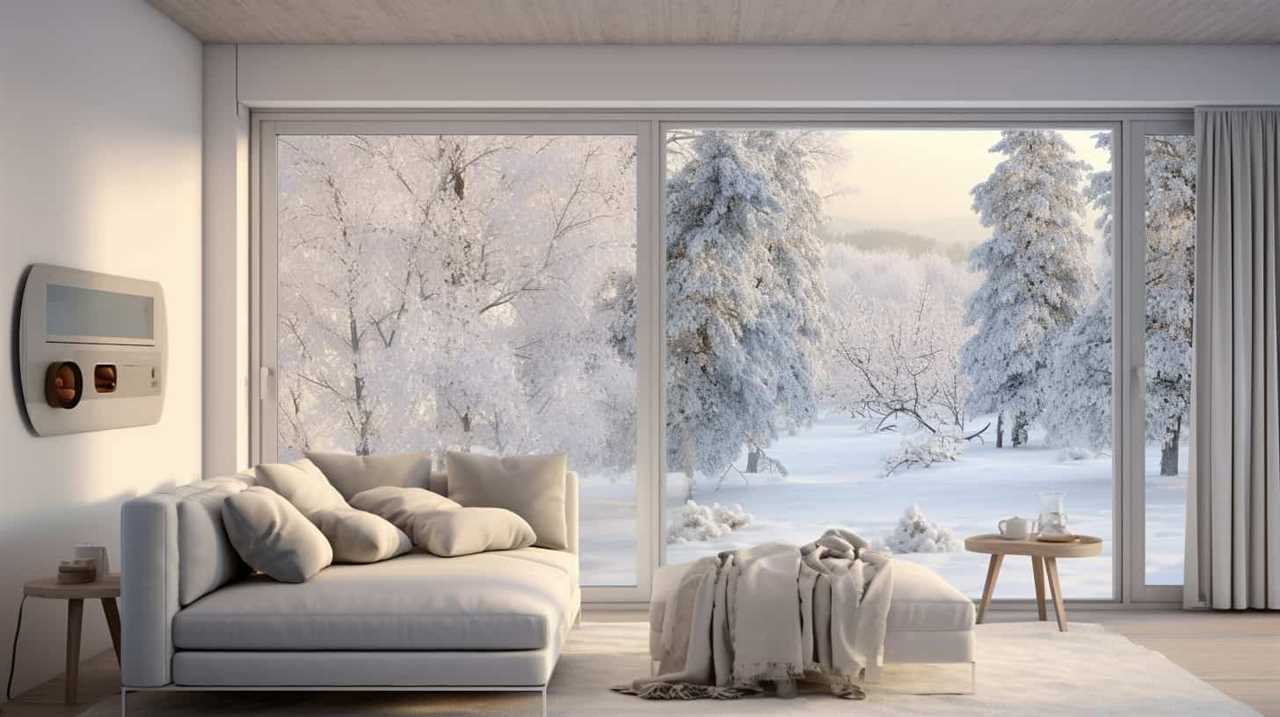
Here are four reasons why upgrading to a high-efficiency heat pump is beneficial and cost-effective:
-
Energy savings: High-efficiency heat pumps are designed to maximize energy efficiency, resulting in significant savings on your utility bills. These models use advanced technology to extract heat from the air or ground more efficiently, reducing the amount of electricity needed to heat or cool your home.
-
Environmental impact: By upgrading to a high-efficiency heat pump, you can reduce your carbon footprint and contribute to a greener environment. These models use less energy, resulting in lower greenhouse gas emissions and a more sustainable heating and cooling solution.
-
Enhanced comfort: High-efficiency heat pumps provide consistent and precise temperature control, ensuring optimal comfort throughout your home. These models are designed to deliver efficient heating and cooling performance, regardless of the outdoor temperature.
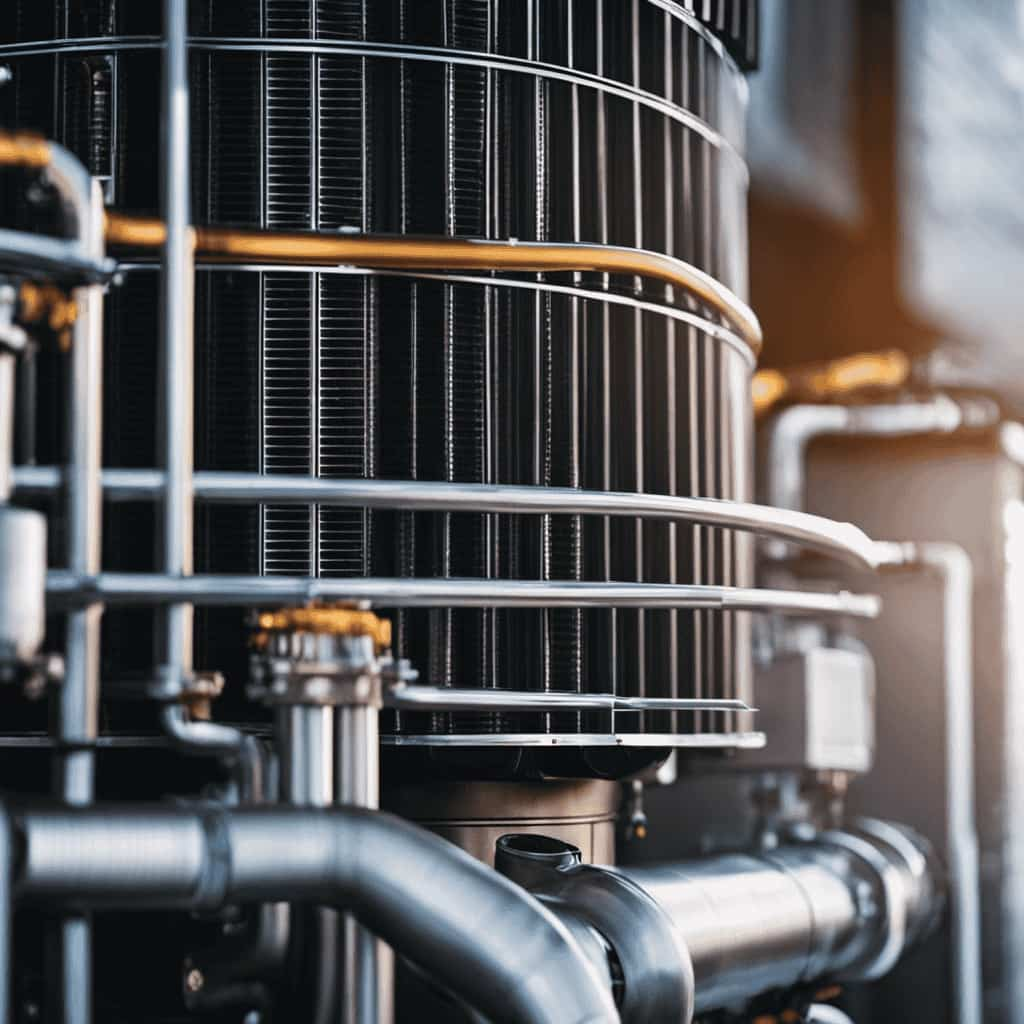
-
Long-term savings: While high-efficiency heat pumps may have a higher upfront cost, they offer long-term savings through reduced energy consumption and lower maintenance requirements. With proper installation and regular maintenance, these models can provide reliable and cost-effective heating and cooling for many years to come.
Frequently Asked Questions
Are Heat Pumps Suitable for All Climates?
Heat pumps can be suitable for all climates, but their efficiency and performance may vary. Factors such as temperature extremes, insulation, and system size can affect heat pump efficiency. Regular maintenance and proper usage can help optimize performance.
Can I Install a Heat Pump Myself?
Installing a heat pump yourself may seem tempting, but it’s important to hire professionals. DIY installation can lead to costly mistakes and safety hazards. According to a study, 85% of heat pump installations are done by professionals.
How Long Does a Heat Pump Typically Last?
Heat pumps typically last around 15-20 years with proper heat pump maintenance. Signs of heat pump failure include inadequate heating or cooling, unusual noises, and increased energy consumption. Regular maintenance can extend the lifespan of your heat pump.
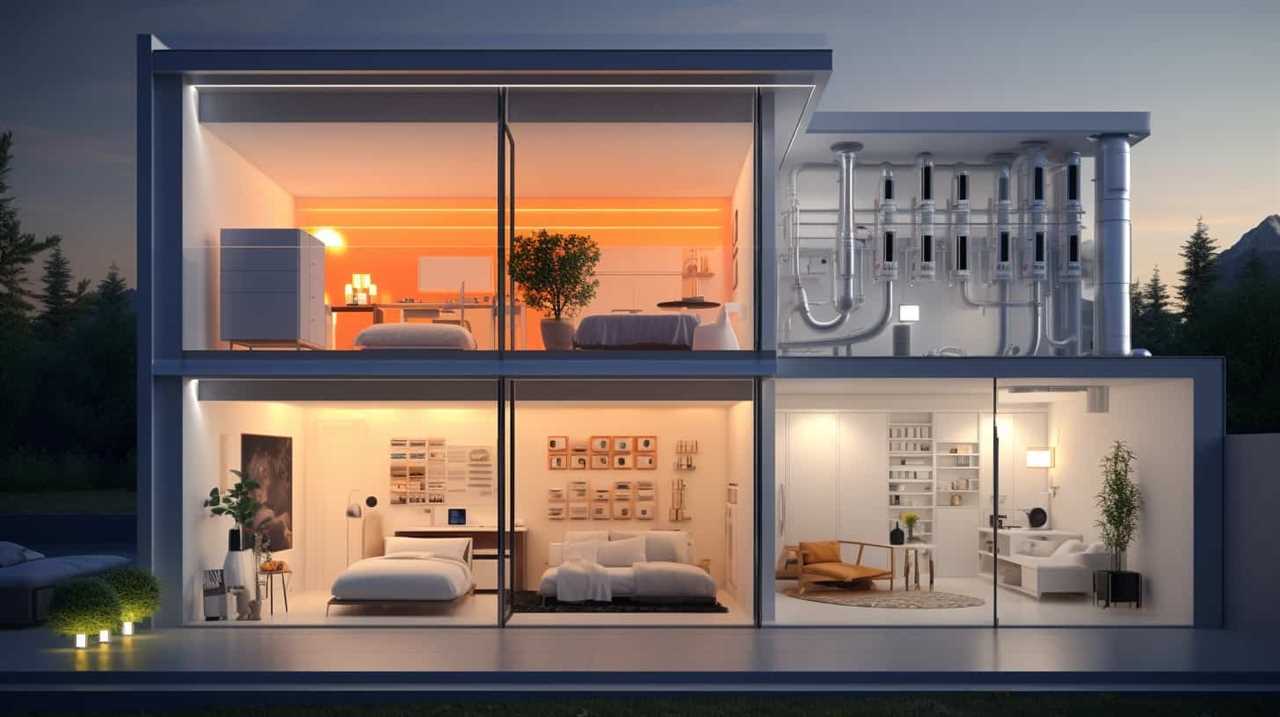
Are Heat Pumps Noisy?
Heat pumps can be noisy, but there are ways to reduce the noise. For example, opting for quiet heat pump models and installing noise-reducing features can help create a quieter and more comfortable environment.
Do Heat Pumps Require a Backup Heating System?
Yes, backup heating systems may be needed in certain situations. It depends on factors like climate and heat pump installation. It’s important to consult with professionals to determine if a backup system is necessary.
Conclusion
In conclusion, by implementing these curated tips, we can significantly enhance the energy efficiency of our heat pumps.
Regular maintenance, optimal temperature settings, and proper insulation are crucial for maximizing performance.
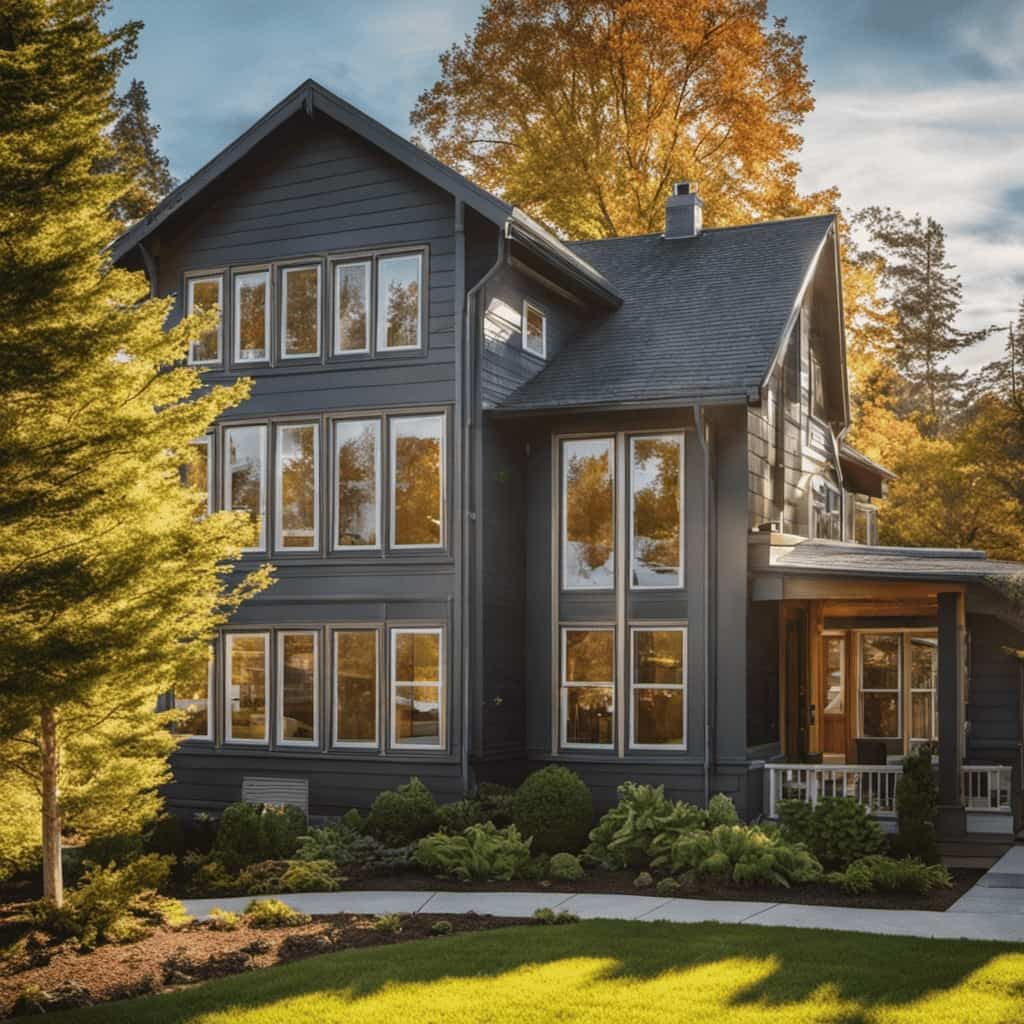
Additionally, utilizing programmable thermostats and energy-efficient window treatments can further reduce energy consumption.
Monitoring refrigerant levels and taking advantage of rebates and incentives are also essential for optimizing efficiency.
Lastly, consider upgrading to a high-efficiency heat pump model for even greater savings.
Remember, ‘a stitch in time saves nine,’ so investing in these measures now will pay off in the long run.

Energy Efficiency
Top Energy-Efficient Heat Pump Models Reviewed


We have completed the research and identified the best energy-efficient heat pump models for you.
Get ready to save on your energy bills and keep your home comfortable all year round.
In this article, we’ll be reviewing the Rheem RP20, Lennox XP25, Carrier Infinity 20, Trane XV20i, and Daikin Quaternity heat pumps.
These models are packed with advanced features and cutting-edge technology.
So, sit back, relax, and let us guide you through the world of energy-efficient heat pumps.
Key Takeaways
- The Rheem RP20, Lennox XP25, Carrier Infinity 20, and Trane XV20i are among the top energy-efficient heat pump models available.
- These models feature advanced technologies such as intelligent eye technology, 4-way airflow system, and advanced filtration system, which contribute to energy savings and improved indoor air quality.
- The Daikin Quaternity heat pump stands out for its high SEER rating, superior performance, and ability to handle extreme weather conditions.
- In addition to their innovative features, these heat pump models offer competitive pricing, long-term cost savings, and warranty coverage, making them an excellent choice for energy-efficient heating and cooling.
Rheem RP20 Heat Pump
The Rheem RP20 Heat Pump stands out as an energy-efficient option due to its exceptional performance and range of features. It offers advanced technology and innovative design, ensuring optimal comfort while minimizing energy consumption. The heat pump features a variable-speed motor that adjusts its speed according to the heating or cooling needs of the home, resulting in reduced energy usage and lower utility bills. Additionally, it is equipped with a two-stage compressor, allowing for more precise temperature control and enhanced efficiency. Overall, the Rheem RP20 Heat Pump is a reliable and energy-efficient solution that provides exceptional performance and comfort for any home.
Lennox XP25 Heat Pump
We found the Lennox XP25 Heat Pump to be an excellent choice for energy efficiency due to its innovative features and advanced technology.
Here are some key points that make the Lennox XP25 Heat Pump stand out:

- Variable-capacity operation allows for precise temperature control and reduced energy consumption.
- The XP25 is ENERGY STAR® certified, ensuring high energy efficiency and cost savings.
- It features a SilentComfort™ technology that minimizes noise levels for a quieter operation.
- The unit is equipped with a SunSource® Solar-Ready option, allowing you to harness the power of the sun for even greater energy savings.
- The XP25 comes with the iComfort® S30 smart thermostat, which provides precise temperature control and advanced programming capabilities.
With its cutting-edge technology and energy-efficient design, the Lennox XP25 Heat Pump offers a reliable and cost-effective solution for maintaining a comfortable home environment while reducing energy consumption.
Now, let’s move on to the next heat pump model: the Carrier Infinity 20 Heat Pump.
Carrier Infinity 20 Heat Pump
Now let’s take a look at the Carrier Infinity 20 Heat Pump, which offers exceptional energy efficiency and advanced features. The Carrier Infinity 20 heat pump is known for its impressive energy-saving capabilities and innovative technologies. It is designed to provide optimal comfort while reducing energy consumption.
Here is a table highlighting the pros and cons of the Carrier Infinity 20 heat pump:

| Pros | Cons |
|---|---|
| Excellent energy efficiency | Higher upfront cost |
| Quiet operation | Requires professional installation |
| Advanced features for enhanced comfort | Limited availability of parts |
The Carrier Infinity 20 heat pump incorporates several energy-saving features, including variable-speed technology, which allows the unit to adjust its output based on the heating or cooling demands, resulting in lower energy consumption. Additionally, it utilizes a two-stage compressor, which helps maintain consistent temperatures and reduces energy usage.
In the next section, we will discuss the Trane XV20i heat pump and its energy-efficient features.
Trane XV20i Heat Pump
Let’s dive into the features of the Trane XV20i Heat Pump, known for its energy efficiency and innovative technology. Here is an analysis of its efficiency and a cost comparison:
Efficiency Analysis:

- The Trane XV20i boasts a SEER (Seasonal Energy Efficiency Ratio) rating of up to 22, making it highly efficient in both heating and cooling modes.
- It also has a HSPF (Heating Seasonal Performance Factor) of up to 10, ensuring efficient heat production during colder months.
- With its variable-speed compressor, the XV20i adjusts its output based on the current temperature and demand, optimizing energy usage.
- The unit’s ComfortLink™ II communicating technology allows for precise control and coordination with other HVAC components, further enhancing efficiency.
- The TruComfort™ technology ensures consistent and even temperatures throughout the home, reducing energy wastage.
Cost Comparison:
- While the initial cost of the Trane XV20i may be higher than some other models, its energy efficiency can lead to significant long-term savings on utility bills.
- The variable-speed compressor and precise control capabilities enable the XV20i to operate at lower speeds for longer durations, resulting in reduced energy consumption.
Transitioning into the subsequent section about the ‘daikin quaternity heat pump’, another top energy-efficient model worth exploring is…
Daikin Quaternity Heat Pump
Moving on to the Daikin Quaternity Heat Pump, let’s explore its features and energy efficiency.
The Daikin Quaternity is a highly efficient heat pump model that offers a wide range of benefits. It comes equipped with advanced features such as intelligent eye technology, which detects human presence and adjusts the temperature accordingly to save energy. The Quaternity also boasts a unique 4-way airflow system that ensures even distribution of warm or cool air throughout the room.

In terms of energy efficiency, the Quaternity has a high SEER rating of up to 20.6, making it one of the most efficient heat pumps on the market. When compared to other Daikin heat pump models, the Quaternity stands out for its superior performance and innovative features.
As for pricing, the Daikin Quaternity is competitively priced, offering excellent value for money.
Frequently Asked Questions
What Is the Average Lifespan of These Heat Pump Models?
On average, the lifespan of these heat pump models is around 15-20 years. However, it is important to note that proper maintenance is crucial to ensure the longevity of the unit. Regular servicing and cleaning can significantly extend its lifespan.
Do These Heat Pump Models Come With a Warranty?
Yes, these heat pump models come with a warranty. We understand that warranty coverage is important to guarantee customer satisfaction. Rest assured, our reviewed models offer reliable warranties to protect your investment.

Are These Heat Pump Models Eligible for Any Energy Efficiency Rebates or Incentives?
Yes, these heat pump models are eligible for energy efficiency rebates and incentives. They offer significant energy savings compared to traditional heating methods, making them a cost-effective and environmentally-friendly choice.
Can These Heat Pump Models Be Used in Both Residential and Commercial Settings?
Yes, these heat pump models can be used in both residential and commercial settings. When considering cost, it’s important to note that residential applications typically have lower energy demands compared to commercial settings.
Are These Heat Pump Models Compatible With Smart Home Technology?
Yes, these heat pump models are compatible with smart home technology. They offer seamless smart home integration, allowing users to control and monitor their energy-saving features remotely, providing convenience and efficiency for both residential and commercial settings.
Conclusion
After reviewing the top energy-efficient heat pump models, it’s clear that each of them offers impressive performance and cost savings.

However, one statistic that stands out is the Rheem RP20 Heat Pump’s Seasonal Energy Efficiency Ratio (SEER) rating of up to 20.5. This means it’s highly efficient in cooling and heating, helping homeowners save on energy bills.
Overall, these models provide excellent options for those looking to improve their home’s energy efficiency.
Energy Efficiency
Boost Your Heat Pump Energy Efficiency Effortlessly

Let’s crank up the efficiency of our heat pumps with minimal effort!
In this article, we’ll explore simple yet effective ways to enhance the energy efficiency of your heat pump.
From understanding efficiency ratings to optimizing placement and size, we’ll cover it all.
We’ll also dive into the importance of regular maintenance, smart thermostat technology, and alternative heating methods.

Get ready to maximize your heat pump’s performance effortlessly.
Key Takeaways
- Understanding heat pump efficiency ratings: SEER rating measures cooling efficiency, HSPF rating measures heating efficiency, higher SEER and HSPF ratings indicate better efficiency and greater energy savings.
- Implementing proper heat pump sizing and placement: Proper insulation reduces heat loss, well-insulated homes require smaller heat pumps, consider noise levels and airflow when placing the heat pump, install it away from direct sunlight and heat sources for improved performance and energy efficiency.
- Regular maintenance and cleaning for optimal performance: Clean or replace air filters every 1-3 months, check and clean the outdoor unit twice a year, schedule professional maintenance annually, remove debris and obstructions around the outdoor unit, dust and vacuum the indoor unit regularly.
- Utilizing smart thermostat technology: Smart thermostats optimize energy efficiency by adjusting the temperature based on heating preferences, allowing for temperature scheduling and remote control, offering energy-saving modes and real-time energy usage data, maximizing efficiency and reducing energy costs effortlessly.
Understanding Heat Pump Efficiency Ratings
As we delve into the topic of understanding heat pump efficiency ratings, it’s important to grasp the significance of these ratings in maximizing energy savings. Heat pump SEER (Seasonal Energy Efficiency Ratio) ratings and HSPF (Heating Seasonal Performance Factor) ratings play a crucial role in determining the efficiency of a heat pump.
The SEER rating measures the cooling efficiency of the heat pump, while the HSPF rating measures its heating efficiency. A higher SEER rating indicates better cooling efficiency, while a higher HSPF rating indicates better heating efficiency. Understanding these ratings helps us make informed decisions when choosing a heat pump, as a higher rating means greater energy savings.
By considering both SEER and HSPF ratings, we can ensure that our heat pump operates efficiently throughout the year.
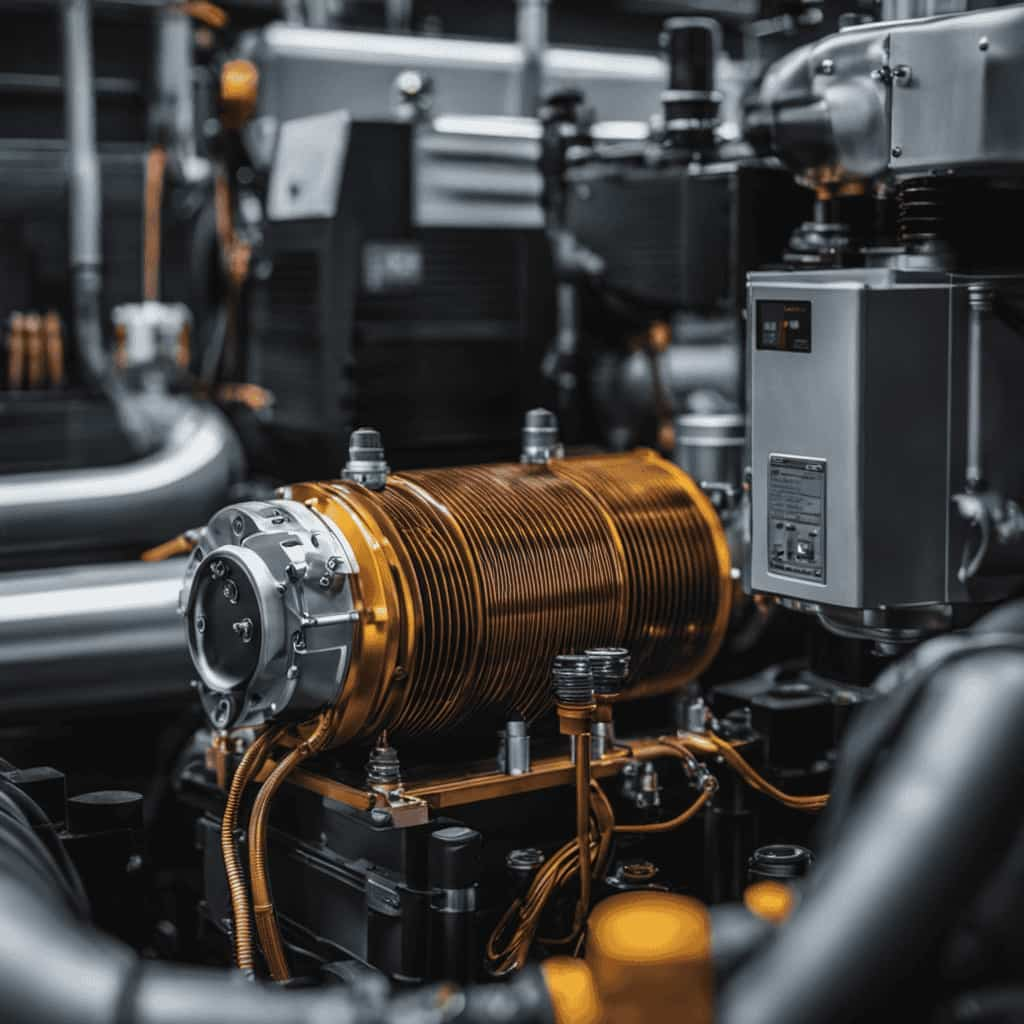
Now, let’s explore how implementing proper heat pump sizing and placement further enhances energy efficiency.
Implementing Proper Heat Pump Sizing and Placement
To ensure optimal energy efficiency, we must carefully determine the correct size and placement of our heat pump. Proper insulation is key to reducing heat loss and ensuring that the heat pump operates efficiently. A well-insulated home will require a smaller heat pump, saving both energy and money.
When it comes to placement, it’s important to consider factors such as noise levels and airflow. The heat pump should be installed in a location that allows for proper air circulation and easy access for maintenance. Additionally, placing the heat pump away from direct sunlight and sources of heat can help prevent overheating and improve its performance.
Regular Maintenance and Cleaning for Optimal Performance
We should regularly maintain and clean our heat pump to ensure optimal performance. By following a maintenance checklist and utilizing effective cleaning techniques, we can prolong the lifespan of our heat pump and maximize its energy efficiency.

Here is a simple maintenance checklist to keep in mind:
| Task | Frequency |
|---|---|
| Clean or replace air filters | Every 1-3 months |
| Check and clean outdoor unit | Twice a year, in spring and fall |
| Schedule professional maintenance | Annually |
In addition to regular maintenance, proper cleaning techniques are essential. Here are some tips:
- Clean the outdoor unit: Remove any debris or leaves around the unit and keep it clear of obstructions to promote proper airflow.
- Clean the indoor unit: Dust and vacuum the indoor unit regularly to prevent dirt buildup that can hinder performance.
- Clean the coils: Use a soft brush or cloth to gently clean the coils, removing any dirt or debris.
Regular maintenance and cleaning will ensure that your heat pump operates at its best. In the next section, we will explore the benefits of utilizing smart thermostat technology.
Utilizing Smart Thermostat Technology
By integrating smart thermostat technology into our heating system, we can optimize energy efficiency and effortlessly control our heat pump.

Smart thermostats provide advanced features that help improve energy consumption and optimize temperature control. These devices can learn our heating preferences and adjust the temperature accordingly, ensuring that our heat pump operates at its most efficient level.
With the ability to program temperature schedules and remotely control the thermostat through smartphone apps, we can easily regulate our heat pump’s operation even when we’re not at home.
Additionally, smart thermostats offer energy-saving modes and provide real-time energy usage data, allowing us to make informed decisions about our energy consumption.
With the use of smart thermostat technology, we can maximize our heat pump’s efficiency and reduce our energy costs effortlessly.

Supplementing Heat Pump Usage With Alternative Heating Methods
Using a few alternative heating methods in conjunction with our heat pump can significantly improve its energy efficiency. Here are some options to consider:
-
Geothermal Heating Benefits:
-
Harness the stable temperature of the earth to provide consistent and efficient heating.
-
Reduce electricity consumption by up to 70% compared to traditional heating systems.

-
Enjoy long-term cost savings and lower carbon emissions.
-
Solar Panel Integration:
-
Install solar panels to generate renewable energy for both heating and electricity needs.
-
Reduce reliance on the grid and lower utility bills.

-
Take advantage of government incentives and tax credits for solar installations.
Frequently Asked Questions
Can I Increase the Energy Efficiency of My Heat Pump by Using Renewable Energy Sources?
Yes, we can increase the energy efficiency of our heat pump by using renewable energy sources. Incorporating solar or geothermal power can reduce reliance on traditional energy and maximize efficiency.
What Are Some Common Mistakes to Avoid When Sizing and Placing a Heat Pump?
When it comes to sizing and placing a heat pump, it’s important to avoid common mistakes. By following best practices, you can ensure optimal efficiency and performance for your heat pump.
Is It Necessary to Hire a Professional for Regular Maintenance and Cleaning of My Heat Pump?
Regular heat pump maintenance by professionals ensures optimal performance and longevity. However, cost-effective DIY cleaning can also be beneficial. It’s important to keep filters clean, check for leaks, and ensure proper airflow for maximum energy efficiency.

How Can a Smart Thermostat Help Improve the Energy Efficiency of My Heat Pump?
A smart thermostat can improve the energy efficiency of our heat pump by utilizing features like programmable schedules and remote control. Integrating our heat pump with a smart thermostat maximizes comfort and reduces energy waste.
Are There Any Government Incentives or Rebates Available for Using Alternative Heating Methods Alongside a Heat Pump?
Yes, there are government incentives and rebates available for using alternative heating methods alongside a heat pump. These incentives encourage the use of renewable energy sources and can help lower your energy costs.
Conclusion
In conclusion, by understanding heat pump efficiency ratings, properly sizing and placing the unit, performing regular maintenance and cleaning, and utilizing smart thermostat technology, you can effortlessly boost your heat pump’s energy efficiency.
Additionally, considering alternative heating methods can further supplement the usage of your heat pump.

By implementing these strategies, you can save energy and maximize the performance of your heat pump, ultimately leading to a more cost-effective and eco-friendly heating solution.
Energy Efficiency
Understanding the Economics of High-Efficiency Heat Pumps

We have exclusive information about the economics of high-efficiency heat pumps. Prepare to analyze the cost-benefit ratio, assess the return on investment, and discover government incentives.
Our article will break down the factors affecting the economic viability of these innovative systems. Whether you’re a homeowner or a business owner, understanding the numbers behind high-efficiency heat pumps is crucial for making informed decisions.
So, let’s crunch some numbers and uncover the economic advantages of these energy-saving powerhouses.
Key Takeaways
- Conducting an economic analysis is crucial for informed decision-making.
- High-efficiency heat pumps offer significant long-term savings.
- Energy savings and reduced environmental impact contribute to a positive return on investment.
- Government incentives and financing options improve economic viability.
The Importance of Economic Analysis in High-Efficiency Heat Pump Installation
We believe that when considering high-efficiency heat pump installation, it’s crucial to conduct an economic analysis.

Economic considerations play a pivotal role in determining the long-term savings and overall cost-effectiveness of such installations.
By conducting a thorough economic analysis, one can assess the upfront costs, operational expenses, and potential savings associated with high-efficiency heat pumps.
This analysis allows for an informed decision-making process, ensuring that the chosen heat pump system aligns with the desired outcomes and budgetary constraints.
Evaluating the economic viability of high-efficiency heat pump installation involves considering factors such as energy efficiency ratings, maintenance costs, and potential utility rebates or incentives.

Additionally, the analysis should assess the projected lifespan of the heat pump system to determine the long-term savings and return on investment.
Understanding the Cost-Benefit Ratio of High-Efficiency Heat Pumps
Our analysis of the cost-benefit ratio shows that high-efficiency heat pumps offer significant long-term savings and a favorable return on investment.
When considering the cost effectiveness of high-efficiency heat pumps, it’s important to look beyond the initial upfront costs. While high-efficiency heat pumps may have a higher initial investment compared to traditional heating systems, the energy savings they provide over time more than make up for this difference.
These heat pumps are designed to operate with maximum efficiency, utilizing advanced technology to minimize energy consumption. This results in lower monthly utility bills, leading to substantial savings over the lifespan of the heat pump.

Additionally, the reduced energy usage helps to decrease the environmental impact, making high-efficiency heat pumps an innovative and sustainable choice for heating and cooling needs.
Factors Affecting the Economic Viability of High-Efficiency Heat Pump Systems
Factors such as energy prices, installation costs, and government incentives play a crucial role in determining the economic viability of high-efficiency heat pump systems.
Energy consumption is a key consideration when evaluating the economic feasibility of these systems. High-efficiency heat pumps are designed to minimize energy usage by efficiently transferring heat from one place to another. By reducing energy consumption, homeowners can significantly lower their utility bills, making the investment in a high-efficiency heat pump system more financially attractive.
Additionally, the environmental impact of high-efficiency heat pumps must be taken into account. These systems produce fewer greenhouse gas emissions compared to traditional heating systems, contributing to a greener and more sustainable future.

Evaluating the return on investment for high-efficiency heat pump installation requires careful consideration of these factors. With lower energy consumption and reduced environmental impact, high-efficiency heat pumps offer a promising solution for both cost savings and environmental stewardship.
Evaluating the Return on Investment for High-Efficiency Heat Pump Installation
When evaluating the return on investment for high-efficiency heat pump installation, it’s important to consider various factors such as energy savings, installation costs, and potential government incentives.
High-efficiency heat pumps offer significant energy savings compared to traditional heating systems. By efficiently transferring heat from the air or ground, these pumps can reduce energy consumption and lower utility bills. Additionally, high-efficiency heat pumps provide long-term benefits by reducing greenhouse gas emissions and promoting sustainability.
While the initial installation costs may be higher than conventional systems, the energy savings over time can offset this expense. Moreover, government incentives such as tax credits or rebates can further enhance the return on investment.

In the following section, we’ll explore government incentives and financing options for high-efficiency heat pumps, which can further improve the economic viability of these systems.
Exploring Government Incentives and Financing Options for High-Efficiency Heat Pumps
To further enhance the economic viability of high-efficiency heat pumps, we’ll now explore government incentives and financing options available. These incentives and financing options can significantly reduce the upfront costs of installing a high-efficiency heat pump system, making it more accessible and affordable for homeowners and businesses alike.
Here are five options to consider:
-
Government grants: Many governments offer grants or financial assistance programs to promote the adoption of energy-efficient technologies, including high-efficiency heat pumps. These grants can help offset the initial investment and encourage more people to switch to these energy-saving systems.

-
Tax credits: Some jurisdictions provide tax credits or deductions for the purchase and installation of high-efficiency heat pumps. These credits can help reduce the overall cost of the system and provide additional savings for the homeowner or business.
-
Low-interest loans: Financial institutions and government agencies often offer low-interest loans specifically for energy-efficient upgrades, including high-efficiency heat pumps. These loans provide favorable terms and repayment options, making it easier to finance the installation of these systems.
-
Energy efficiency programs: Many utility companies offer energy efficiency programs that provide incentives for customers to upgrade to high-efficiency heat pumps. These programs may include rebates, discounts, or other financial incentives to encourage the adoption of energy-saving technologies.
-
Power purchase agreements: In some cases, homeowners or businesses can enter into power purchase agreements with third-party providers. These agreements allow the customer to pay for the energy produced by the high-efficiency heat pump system, rather than the upfront cost of the equipment itself. This can provide a more affordable and flexible financing option.

Frequently Asked Questions
How Does the Efficiency of a High-Efficiency Heat Pump Compare to Traditional Heating Systems?
High-efficiency heat pumps outperform traditional heating systems in terms of efficiency and cost. By utilizing advanced technology, these pumps can achieve higher levels of efficiency, resulting in significant energy savings and lower utility bills.
Are There Any Maintenance or Repair Costs Associated With High-Efficiency Heat Pumps?
Maintenance and repair costs for high-efficiency heat pumps are important factors to consider. Regular maintenance can help prevent major issues, but occasional repair expenses may arise. These costs should be factored into the overall economics of the system.
Can High-Efficiency Heat Pumps Be Used in Both Residential and Commercial Buildings?
Yes, high-efficiency heat pumps can be used in both residential and commercial buildings. They offer energy-efficient heating and cooling solutions for various applications, making them a versatile choice for innovative and sustainable HVAC systems.
Are There Any Environmental Benefits to Using High-Efficiency Heat Pumps?
Using high-efficiency heat pumps has significant environmental benefits. They reduce greenhouse gas emissions and contribute to energy savings. These pumps are a sustainable and innovative solution for both residential and commercial buildings.

What Factors Should Be Considered When Choosing the Right Size High-Efficiency Heat Pump for a Specific Space?
When choosing the right size high-efficiency heat pump, several factors should be considered. These include the square footage of the space, insulation levels, climate conditions, and desired temperature settings.
Conclusion
In conclusion, understanding the economics of high-efficiency heat pumps is crucial for making informed decisions. By analyzing the cost-benefit ratio and evaluating factors such as installation costs, energy savings, and government incentives, we can determine the economic viability of these systems.
With their potential for significant return on investment and the availability of financing options, high-efficiency heat pumps offer a promising solution for efficient and cost-effective heating and cooling.
Embrace the power of these systems and unlock a world of economic benefits.

-

 Residential and Commercial Applications4 months ago
Residential and Commercial Applications4 months agoBest Amana Heat Pump Reviews
-

 Thermal Energy Transfer4 months ago
Thermal Energy Transfer4 months agoBreakthroughs in Modern Heat Pump Systems: Thermal Energy Edition
-

 Residential and Commercial Applications4 months ago
Residential and Commercial Applications4 months agoBest Heat Pump
-

 Geothermal Heat Pumps3 months ago
Geothermal Heat Pumps3 months agoUpgrade Your Comfort with Our Efficient HVAC Systems
-

 Geothermal Heat Pumps3 months ago
Geothermal Heat Pumps3 months agoInnovative Geothermal Heat Pump Manufacturers Revolutionize Energy Efficiency
-

 Air Conditioning2 months ago
Air Conditioning2 months agoExploring Energy-Efficient Air Conditioning Heat Pumps
-

 Thermal Energy Transfer1 month ago
Thermal Energy Transfer1 month agoBoost Your Heat Pump Efficiency: Interactive Guide
-

 Air Conditioning4 months ago
Air Conditioning4 months agoHeat Pumps Outperform Traditional Heating in Energy Use











